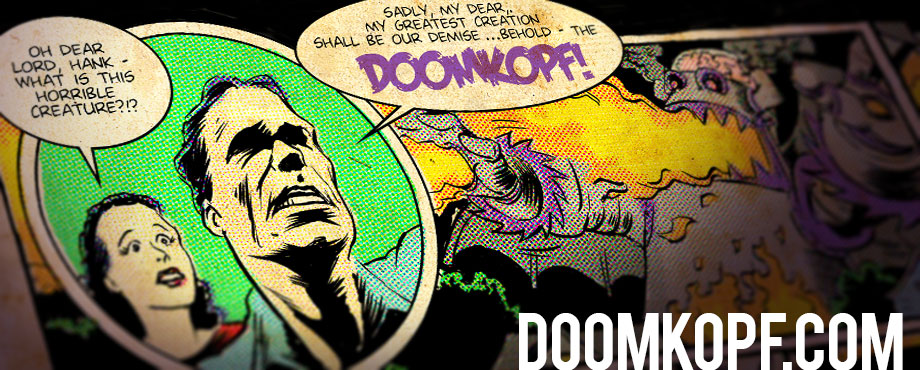Chris Gumprich and Dennis Culver of “Undercard”
Some weeks back, I posted this review of Undercard, a new self-published book written by Chris Gumprich and illustrated by Dennis Culver. Gumprich, who can be added to the list of creators who’ve encountered our site via Google, and Culver were nice enough to answer a few questions on the making of their book, which takes a completely unexplored path into the heart of boxing, a genre that’s been done, done and done.
 JCVD: So far, what has been the most rewarding part of having this book
JCVD: So far, what has been the most rewarding part of having this book
published? And how long/difficult was the process of seeing it published?
CHRIS: It’s always nice to see a vision become a reality, but this is really just a waypoint on the journey. Getting the first issue completed and out there is a nice feeling, but there’s a lot of work still to be done — we have to get the book into people’s hands. I guess what I’m trying to say is that there hasn’t been any time to reflect on what we’ve accomplished.
JCVD: How did you two come to know each other and work together?
CHRIS: Dennis denies this, but we met in 2004 at APE in San Francisco. Shortly after that we worked together on a graphic novel pitch that went nowhere. We enjoyed working together, and he was the first guy that came to mind when I scripted UNDERCARD. We subsequently put together a mini-comic called ROUND FOUR, which was relatively successful (both artistically and commercially) and served as a nice lead-in to UNDERCARD.
DENNIS: Yeah i just thought Chris emailed me out of the blue and liking his writing, I decided to give collaboration a shot. I think our work together keeps getting stronger.
JCVD: Where did the story idea come from, and how did it develop as the process went along? Are either of you fans of boxing?
CHRIS: I’m a boxing fan, both fact and fiction. One of the things I noticed about boxing fiction is that it always followed a set template — the underdog struggling against all odds to become a champion. Rocky, Raging Bull, Million-Dollar Baby — the dressing may change, but the underlying story is always the same. While it makes for a nice feel-good story, it doesn’t reflect the reality — there are thousands of boxers out there who never get their title shot, and never will. So why do they keep getting into
the ring, putting their lives at risk for a million-to-one shot at the big time? How bad do things have to get before you abandon the dream?
This is a story that anyone can relate to, and that was the attraction — to tell the story of someone who hasn’t made it, isn’t going to make it, but is still out there trying.
DENNIS: I’m more of a fan of fiction centered around boxing as opposed to the sport so it definitly helped that Chris had such a strong passion for the sport. He pretty much had me on board when he told me that i’d to draw dudes beating each other senseless.
JCVD: Is this a finite story? And how much is plotted ahead? You’ll be putting out four issues a year, right?
CHRIS: The book was originally planned as a complete OGN, but we decided it would be easier to get out there by breaking it up into six pieces. (This required very little change to the story, as I had written it in six “acts.”) The scripts are complete, although there is always some editing as you go along. It is a finite story, with a very definite ending.
The current plan is to release the six issues on a quarterly basis, unless a publisher shows some interest. Frankly, we’d love to release it monthly, or directly to OGN, but we can’t afford it.
DENNIS: Initially we were just talking about putting together a pitch package and sending it around but after talking during 2006’s APE we decided what we were doing was strong enough to put ourselves with or without a publisher. Putting it out more frequently would be ideal but handling all the printing and production coupled with the finances means a quarterly schedule.
JCVD: In the first issue, Joe seems to be at the end of the line as far as boxing goes. Will there be more flashbacks to his earlier days, or is he going back to the ring?
CHRIS: Who says he’s at the end of the line? Dreams die hard.
DENNIS: Joe’s like a lot of people that don’t know when to quit, they fall hard usually, but sometimes they get what they’re after.
JCVD: The book has garnered some attention, not an easy accomplishment for a self-published comic. How have you been promoting it, and where do you want to see it go?
CHRIS: We’ve been trying to get the word into the ears of those who will spread the word. We’ve had a few interviews on websites, but are also talking up the book every chance we get — everything from television stations to newspapers to weblogs. The ultimate goal is to get a standalone collection out on the stands — whether self-published or through an established publisher.
DENNIS: A lot of think a comic is done once it’s printed but that’s only half the other half is making sure people know about the work. Chris and I have both had different backgrounds doing promotion. he’s been involved in politics while I’ve spent a few years in sales. I think the attention we’ve gotten has been a direct result of that experience.
To order Undercard, go here.
